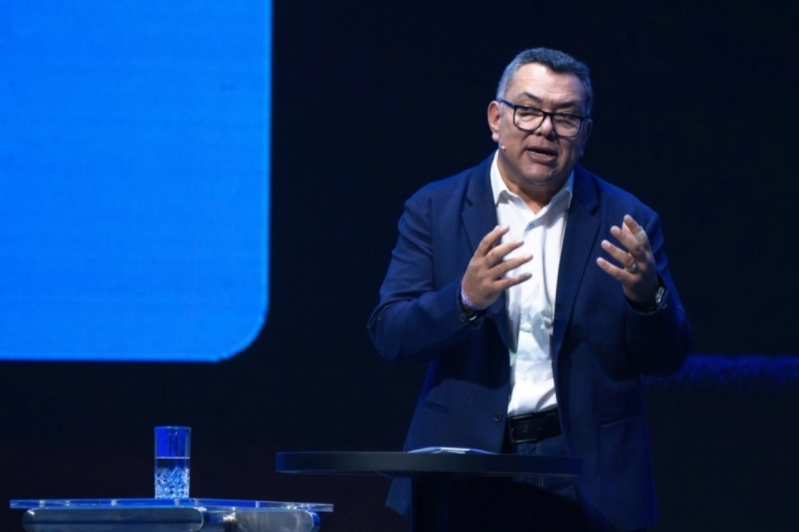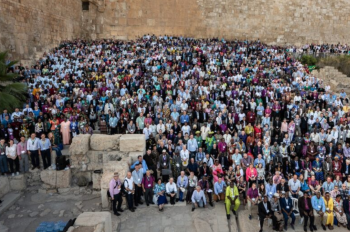
During the Fourth Lausanne Congress on World Evangelization in Incheon, Korea last week, Costa Rican missionary Allan Matamoros presented the changes that have been emerging among evangelicals in Latin America. He spoke about how God is transforming Latin America from a mission field to a missionary sending region that reaches out into the world.
Since his youth, Matamoros dedicated his life to following and serving Jesus in world missions with the vision of transforming Latin America from a mission field to a mission force. In 2004, Allan became the international director of PM-International, with his wife Patricia serving as the Project Director of the same initiative. PMI is a Latin American church planting mission that focuses on the Muslim world, where they served for 12 years.
In his speech he noted that “it is estimated that probably 30,000 Ibero-Americans have become cross-cultural missionaries, serving in 200 political countries and dozens of ethnic groups in different religions and with different vocational services, church planting, humanitarian aid, and Bible translation.”
“How did the Latin American church reach the point of being globally involved in the mission of God in all nations?”
He took participants on a historical journey that goes back to the 1980s with various ministries and initiatives to advance the preaching of the gospel. He also recalled two congresses held at the beginning of the 20th century.
“During the Edinburgh Missions Congress, the consensus of the missionary organizations was not to include Latin America for their missionary purposes, apparently to avoid publicity. It was in Panama, in 1916, that they decided to start working in our countries. One hundred or almost one hundred years after those meetings in Edinburgh and Panama, the evangelical population in Latin America, according to the Latin Evangelical Alliance (AEL), increased to 27% of the population of the continent and represents about 160 million evangelicals in total.”
These figures and growth speak of a continental transformation that according to Matamoros “began mainly among the marginal classes of our societies, causing a dramatic and positive transformation in the values, economy and quality of life of many of our families.” With this in mind, he proposed to speak of the “Ibero American Missionary Cooperation”.
“At the same time, while the missionary task was implanted in the continent, the integral mission movement was growing during the same season. So the whole idea of preaching the gospel with words and our lives has become a very important part of the journey,” he recounted enthusiastically. According to his Matamoros, this provoked a greater interest in preaching Christ, not only on the American continent, but it took an expansive wave towards other places, especially the Muslim world.
“I remember sitting with Muslims, as well as Latino missionaries, reflecting on their cities, on how to connect the gospel in Muslim contexts in places very different from the Latino world. Along the way, we found evidence of the mosaic of Latin American cultures, with our background of instability, justice and injustice, and suffering, which has created a belief in the possibilities of sharing with different cultures. This pain, for example, has connected well with the local people we have been serving and reaching out to at the same time,” he said.
He also said that this background “has helped us to share meaningful relationships, friendship and solidarity with the groups of people we want to share with. The same happens with family values, with our spiritual understanding, our spiritual vision and, what else? The similarities in different expressions and colors, arts, music, food and even sports. We have a better world. So we share with you all that we are with the people groups and nations we are serving.”
One of the favorable factors he identified is the fact that they do not belong to major international political powers. “The fact that many of us come from nations that are not linked to global political powers has become an asset in the eyes of our local friends, almost everywhere we serve. For example, no one knows where Costa Rica is.”
He said that his desire and that of the Latin missionary movements in general “is to make disciples of everyone and everywhere. And we have been well received, whether in North Africa, Central Asia or Indonesia.”
He also presented some of the problems that arise, especially issues related to financial support of the missionaries and the work they develop. He spoke of projects that tend to “create ways, as businesses or professionals and other means, to support our movement. At this moment we are updating our training initiatives, especially in the areas of mission, theological transformation, and team dynamics, following the model of Disciple America.”
In closing he expressed his hope for the coming of a new generation: “ We are asking the Lord of the harvest for a new way of young Latino leaders to take the lead of the missionary mandate in their hands for the glory of his kingdom and the worship of his name in every nation and people group on earth.”
First published by Diario Cristiano, Christian Daily International's Spanish edition.





